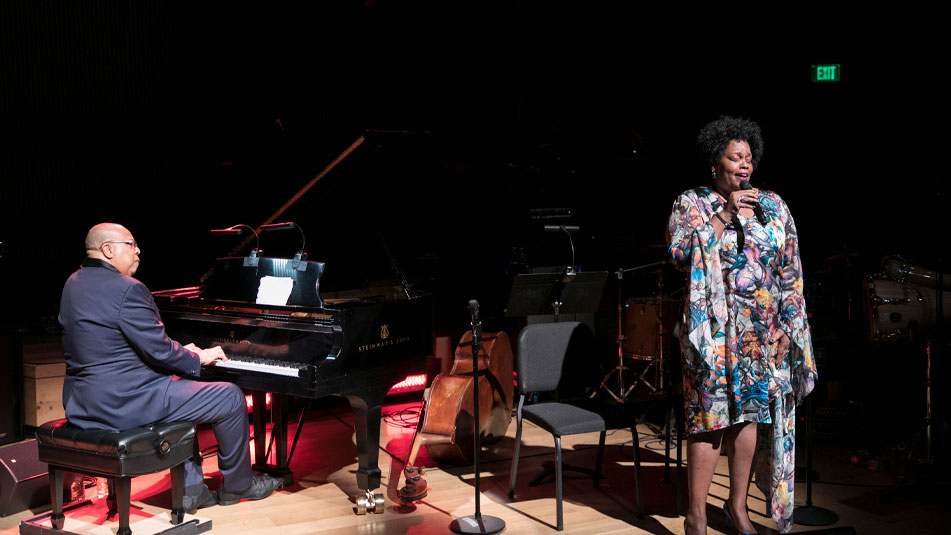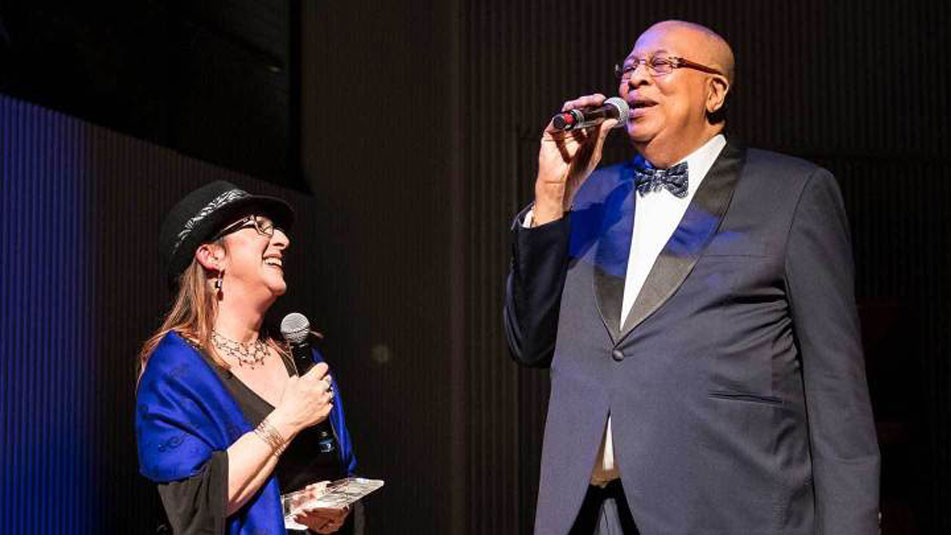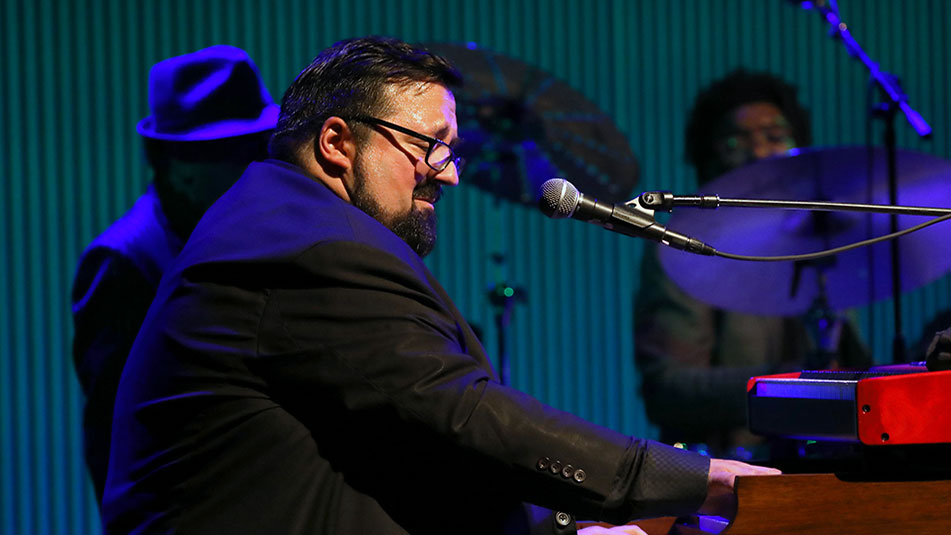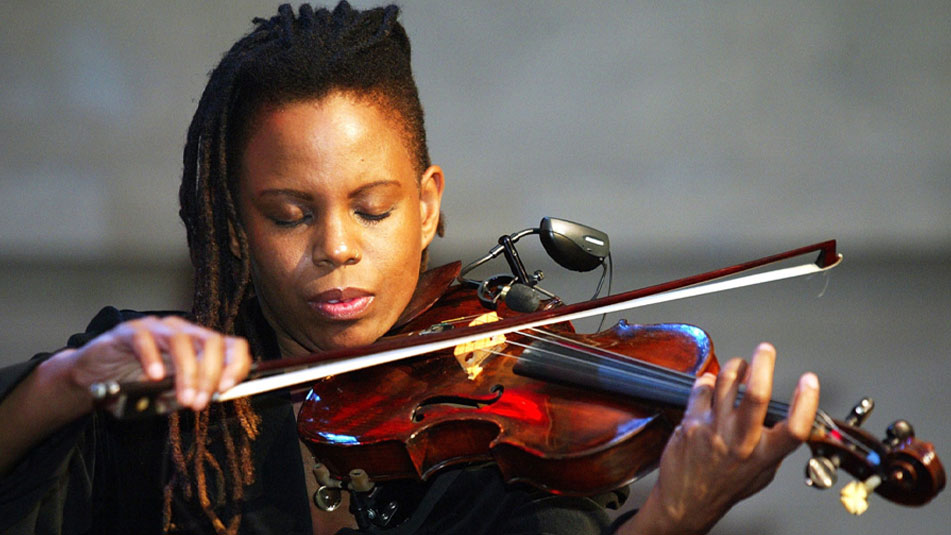Chucho Valdés:
hungry for musical adventures
September 27, 2019 | by Richard Scheinin

Chucho Valdes and Dianne Reeves at the SFJAZZ Gala (Photo Credit: Scott Chernis)
Pianist Chucho Valdés had been a Dianne Reeves fanatic for years. He’d worn out her albums. He’d seen her perform on stage. Yet he had never played with the singer — until January 2019 when, on a hunch, he invited her to San Francisco as a special guest at the SFJAZZ Gala, where he was about to be honored with a Lifetime Achievement Award, honoring his 60-year career. The hunch worked out. Performing “My Foolish Heart” as a duo, without any rehearsal, Valdés and Reeves melted into the song, becoming a single sound: “The tears came out of my eyes, listening to her as we played,” he recalls. “She touched the most sensitive fiber of my being. I absolutely fell in love with her.”
Nearly a year has passed, and still, Valdés says, “Dianne Reeves has me completely hypnotized!” They are a fit, and that’s why she is returning to SFJAZZ for Valdés’s upcoming residency (Oct. 3-6) with his Jazz Batá Quartet. Each night, Valdés — the legendary Cuban pianist, composer and founder of the groundbreaking group Irakere — will perform with a different guest. “I think 90 percent of what I do in this setting is completely spontaneous,” he says, laughing. And yet a nearly hour-long phone conversation with Valdés, speaking from his home in Miami, reveals that he has put a considerable amount of planning into the residency. Handed a blank slate, he has designed his four programs by relying on both intuition — those hunches — along with careful calculations. As one of SFJAZZ’s Resident Artistic Directors, he has been given a chance to create something completely new, he says, to deepen his artistry through collaborations with four intensely different artists: Joey DeFrancesco, the Hammond B-3 organ virtuoso (Oct. 3); Kenny Garrett, the master saxophonist (Oct. 4); Reeves (Oct. 5) and Regina Carter, one of the great improvising violinists. (Oct. 6).
Preparing for the residency “has opened many windows of possibilities in my mind,” says Valdés, 77. He expects that all of his guests will approach the collaborations with a similarly open attitude: Who knows what will happen? Valdés anticipates many eureka moments — and that the upcoming week will bring about “an opening or an expansion of our collective imaginations. As my music teacher Zenaida Romeu used to say to me, when I became a bit stubborn during a lesson, 'The brain is like a parachute. If you don’t open it, you know what is going to happen.'”
There’s another piece to this game of creative expansion: As Valdés explores new territory, so will his audiences. They will get to see new sides of Valdés, who has spent a lifetime creating a combustible hybrid music, full of surprises. Going back to the 1960s, he has merged jazz, bebop and funk, along with the Yoruban liturgical music of West Africa and the classical etudes he studied as a teen in Havana with his counterpoint teacher Romeu. Now well into his senior years, he remains hungry for musical adventures. It’s just how he operates, and the audience should get a sense of this during his residency, as it follows Valdés into previously uncharted waters. When planning a residency — hell, when planning anything at all, Valdés says — he is “always moving forward,” looking for the key to open the next musical door.

Rebeca Mauleón and Chucho Valdés
He was just back from a tour of Europe and the Dominican Republic when he got on the phone to discuss his residency. He spoke in Spanish; pianist Rebeca Mauleón, his friend and biographer — she’s also Director of Education at SFJAZZ — acted as translator for Valdés, who explained the thinking behind each of his four San Francisco shows.
JOEY DEFRANCESCO (Oct. 3)

Joey DeFrancesco
Valdés always has pushed beyond what’s expected of him; he inherited the trait from his father, Bebo Valdés, the great Cuban pianist and bandleader. Why stay in your comfort zone? It’s more fun to move past it, with new collaborators, and then to establish a new common ground. That’s what Valdés hopes to accomplish with DeFrancesco. The idea of merging the sounds of an acoustic piano and an earthshaking Hammond B-3 organ is not, on the face of it, entirely logical. But last February, Valdés and DeFrancesco found themselves on the “Blue Note at Sea” jazz cruise. They had never met before, Valdés recalls, and “we totally hit it off. We did a show together that was completely unplanned and unrehearsed — amazing.” They played “Stella By Starlight,” “Autumn Leaves” and “Blue Monk.” It was “the first time I had ever performed with someone playing a B-3 — a completely new experience — and we knew we wanted to collaborate in the future. When my SFJAZZ residency came up,” Valdés recounts, “I called him to ask if he would join me, and his 'yes’ was without any hesitation.”
DeFrancesco and Valdés have a lot in common. Both are former prodigies; DeFranceso joined Miles Davis’s band at age 17, while Valdés inherited his father’s directorship of the house band at Havana’s famed Tropicana Club when he was 19. Both are soulful players, informed by the conservatory and the street. Both listen widely. When they began discussing repertory for the upcoming show in San Francisco, it became apparent that DeFrancesco — not particularly well known for playing Cuban music — had been studying Valdés’s Jazz Batá 2 CD, which has been nominated for a 2019 Latin GRAMMY Award. The organist suggested that they play “a bunch of tunes from the album, which killed me,” Valdés says. “I thought to myself, 'Madre mia, this is going to be good!”
DeFrancesco chose three pieces: “Obatalá,” based on a Yoruban liturgical rhythm; “Son XXI,” Valdés’ arrangement of a tune by the late Cuban composer Enrique Ubieta; and “Chucho’s Mood,” a descarga that builds over a three-note tumbao rhythm. They also decided to play a handful of standards, including Tadd Dameron’s “Lady Bird,” Charlie Parker’s “Confirmation” and Miles Davis’s “Solar.” Choosing a repertoire that suits both parties rests on considering “both perspectives, both sides of the equation,” Valdés says. “We simply make our choices and agree — without playing a single note on our instruments. Of course, so much can happen on stage that we hadn’t planned, and that’s when the magic happens.”
KENNY GARRETT (Oct. 4)
One senses a kinship between Valdés and saxophonist Garrett: the love of the drum, the deep African roots, the ability to elevate the music and practically take listeners into a trance state. Garrett “loves the Afro-Cuban stuff, the rhythm,” Valdés says.
Garrett is a serious student of Cuban music, generally, and of Valdés’ music, specifically. When they began discussing possibilities for their show, it didn’t take long for Garrett to reach back into the Valdés songbook: “He suggested we play an older tune of mine called 'Los Guiros,’ which features a part where he plays solo with the guiros,” Valdés explains, referring to the round, beaded gourds that primarily are used in Afro-Cuban liturgical music. After Garrett made his suggestion, the pianist made one of his own: “I suggested we cover 'Mambo Influenciado,’” a Valdés tune from 1963, now canonized as a Latin jazz standard. Like DeFrancesco, Garrett was keen on playing several pieces from JazzBatá 2. They chose two: “Son XXI” and “El Guije,” Valdés’s musical depiction of a mythical Cuban river creature. Inspired by all this back-and-forth preparation, Valdés has now composed a piece for Garrett: It’s titled “One for Kenny,” and it will receive its first performance in San Francisco.
Over the past several years, Valdés and Garrett have performed together at a number of European festivals. Their temperaments and personal histories are closely matched.
As a young musician in Cuba, Valdés listened to Art Blakey and Freddie Hubbard, to McCoy Tyner and Elvin Jones, to Earth Wind & Fire and electric Miles Davis. Garrett, 20 years younger than Valdés, spent five formative years with Davis during the trumpeter’s late electric period. He also played with Blakey, Hubbard, Tyner and Jones — and his soulful cry on the saxophone owes something to his love of R&B, soul and funk, as epitomized by Earth, Wind & Fire. It’s almost as if these two musicians have been living in parallel. And it’s no wonder that Valdés invited Garrett to be one of his guests at SFJAZZ: “When I mentioned the residency, he was totally on board,” the pianist says. “He said, 'Let’s go, right now!'”
DIANNE REEVES (Oct. 5)
Also a Resident Artistic Director at SFJAZZ, Reeves is classically trained, like Valdés. Both have performed in electrified jazz-fusion bands. Both, of course, are also straight-ahead acoustic swingers — and increasingly, Reeves is drawn to Cuban, Brazilian and other Latin American song forms. All of that contributes to the connection between the singer and Valdés. But how, really, do you explain their kismet moment at the 2019 Gala? “She is simply amazing, and, honestly, I do not have enough words to describe how I feel about her,” Valdés says. “Even before we played together, she already was a favorite singer of mine.”
It was a no-brainer, he says, to invite Reeves to the residency. Over the phone, they have “tossed around a few ideas for standards, and we definitely want to include 'Stella by Starlight,’ 'Caravan,’ and 'Summertime,’” which they plan to perform as a kind of waltz. They also have settled on “a classic I had heard her do before that electrified me: 'Skylark.’ And of course we have to do a blues!” He can’t wait — and jokes that there’s always the possibility of winging it, tossing out their plans when freedom calls: “Well, this always happens. You come in thinking one thing, but whatever you feel in the moment is what dictates the actual outcome. So many choices that we never thought of suddenly emerge. That is the joy of the act of improvisation, the not knowing what will happen next, and the happy surprise that results.”
REGINA CARTER (Oct. 6)

Regina Carter
During his 60 years as a professional musician, Valdés has played with, quite literally, everyone under the sun — from trumpeter Wynton Marsalis to Lang Lang, the concert pianist. As a result, when he began to think about potential guests for his residency, there were almost too many possibilities to consider. And yet, he says, “I immediately thought of Regina Carter.”
He and Carter are musicians who transcend genres. Friends for years, their collaboration at SFJAZZ is a natural, building upon Carter’s passionate guest performances on Jazz Batá 2. The recording offers a grand synthesis: Seamlessly, it combines the Yoruban liturgical music of West Africa with popular Cuban dance rhythms and jazz.
This hybrid approach has been Valdés’ stock-in-trade for at least half a century. He absorbed it from his father, and he advanced it with Irakere. A generation younger than Valdés, Carter, a native of Detroit, has followed a similar path. Her muse has led her from European classical music to bebop, Southern blues and Afro-Cuban folk forms. That’s why Valdés — who calls her “a genius of the violin” — asked her to record with him on Jazz Batá 2. She performs on the album’s centerpiece tracks: “100 Años de Bebo (100 Years of Bebo),” a danzon-mambo tribute to his father, and “Ochún,” which evokes the Yoruban orisha. Also the patron saint of Cuba, Ochún — synonymous with Our Lady of Charity, a representation of the Virgin Mary — is said to be the lover of the exquisite and the refined. The sweet sound of the violin is traditionally associated with Ochún. Valdés associates that sound of beauty with Regina Carter: “I feel lucky to be able to witness it,” he says of her artistry. “Regina has made so many profound musical connections — she spent a good number of years playing Cuban music, which is why I knew our collaboration would be a good fit. Of course, so much of her musical curiosity and creativity will be more apparent in a live setting, on stage,” he says. Even more than on the recording, he predicts, she will “transmit that amazing spirit to the band as we accompany her. I know it will be magical.”
As with his other guests, the process of choosing repertory with Carter has been collaborative — or “bilateral,” as he puts it. “With Regina, we talked about exploring something by (Thelonious) Monk, who I have always adored, and we also selected a few standards to play… Plus, she loves playing danzones — she sounds like a Cuban playing the danzón, let me tell you! We have decided to include two classic pieces: the danzón 'Almendra' and also 'El Cumbanchero,'” by the Puerto Rican composer Rafael Hernandez. Valdés is certain that Carter will navigate this varied repertoire with grace and beauty: “She is such an incredible talent,” he says, calling her “the perfect ingredient for my vision.”
As if you can’t tell, Valdés is brimming with anticipation as his residency approaches. He lets it slip that he will premiere two more compositions. One, titled “Susan,” is a piece for solo piano, dedicated to Susan Sillins, a patron of SFJAZZ and Cuban music, generally. The other is “Á Orlando Cepeda,” composed for the Jazz Batá Quartet in honor of the Hall of Fame slugger, who is an old friend and a big jazz fan.
Finally, it doesn’t take much to get Valdés thinking about possibilities for his next trip to the SFJAZZ Center. He imagines a stage lined with grand pianos — four of them. He’ll invite his favorite pianists to play with him. Who, exactly? He pauses for about two seconds, then names his dream team: “Herbie (Hancock), Chick (Corea) and Brad Mehldau.”
He can’t wait.
Chucho Valdés: Jazz Batá Quartet performs October 3-6 in Miner Auditorium at the SFJAZZ Center.
